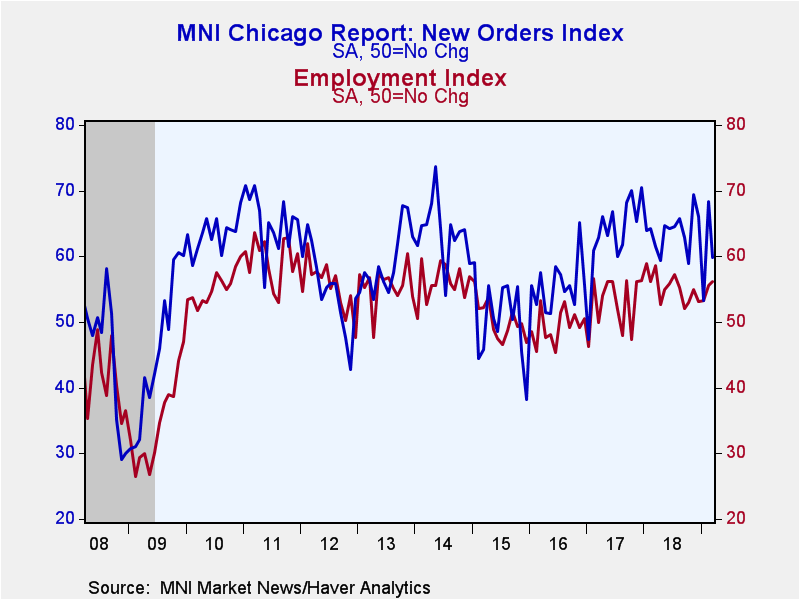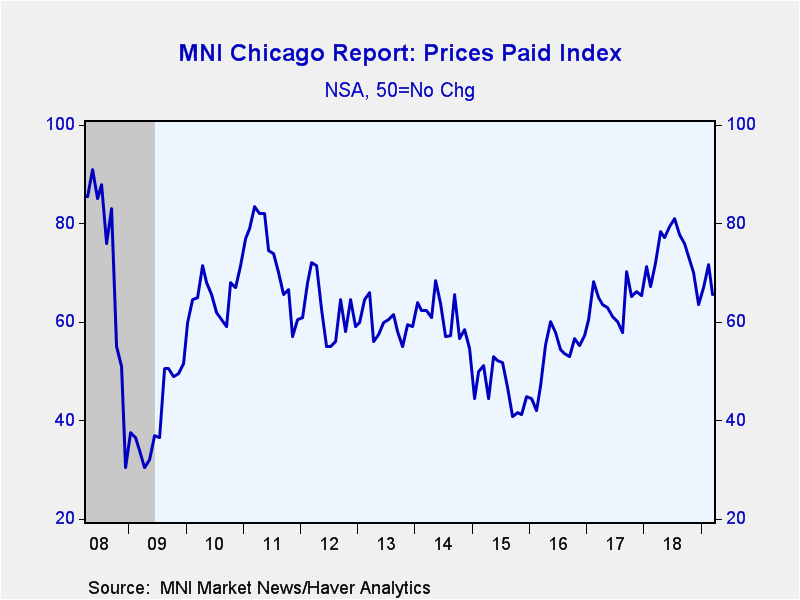 Global| Mar 29 2019
Global| Mar 29 2019U.S. Chicago Business Barometer Fell Back in March
by:Sandy Batten
|in:Economy in Brief
Summary
The Chicago Purchasing Managers Business Barometer fell back to 58.7 in March after having surged to 64.7 in February. The February reading had been the highest since December 2017. The Action Economics Forecast Survey expected a [...]
The Chicago Purchasing Managers Business Barometer fell back to 58.7 in March after having surged to 64.7 in February. The February reading had been the highest since December 2017. The Action Economics Forecast Survey expected a decline to 61.0. The Chicago Purchasing Managers figures are diffusion indexes where readings above 50 indicate growth.
Haver Analytics constructs an ISM-Adjusted Chicago Business Barometer using methodology similar to the construction of the ISM Composite Index. This index fell to 57.7 in March from 59.8, suggesting continued healthy growth but at a slower pace than in February. Over the past 15 years, the ISM-adjusted Chicago index has an 83% correlation with the national ISM Manufacturing Index, which is scheduled for release on Monday.
While the index remains elevated and well above the critical level, its Q1 average is down from Q4 and from 2018 Q1, indicating that the pace of growth of activity has slowed over both the past quarter and the past year.
Across the component indexes, production fell to 64.2 from 67.3. New orders slumped to 59.8 fro, 68.4. Order backlogs declined the most, falling to a below-50 44.7 from 63.6. This is the lowest reading on for the orders backlog index since December 2016 and its first reading below 50 since January 2017. Inventories edged down to 47.4 from 47.8.
The employment index was the only component to rise in March, increasing to 56.2 from 55.5. The proportion of survey respondents (not seasonally adjusted) that indicated higher employment rose further in March to 28% while the percentage reducing employment was unchanged at 19%. The prices paid index continued its recent downtrend (which had been interrupted by the rise in February), declining to 64.5 in March from 71.2, the biggest monthly decline in 17 months to its lowest level since August 2017.
The MNI Chicago Report is produced by MNI in partnership with ISM-Chicago. The survey covers a sample of over 200 purchasing professionals in the Chicago area with a monthly response rate of about 50%. Summary data are contained in Haver's USECON database, with detail including the ISM-style index in the SURVEYS database. The Action Economics Forecast Survey is available in AS1REPNA.
| Chicago Purchasing Managers Index (%, SA) | Mar | Feb | Jan | Mar '18 | 2018 | 2017 | 2016 |
|---|---|---|---|---|---|---|---|
| General Business Barometer | 58.7 | 64.7 | 56.7 | 59.6 | 62.4 | 60.7 | 53.0 |
| ISM-Adjusted General Business Barometer | 57.7 | 59.8 | 55.7 | 59.8 | 60.7 | 59.0 | 51.9 |
| Production | 64.2 | 67.3 | 58.8 | 57.8 | 64.5 | 64.2 | 54.5 |
| New Orders | 59.8 | 68.4 | 53.2 | 61.5 | 63.8 | 63.6 | 55.6 |
| Order Backlogs | 44.7 | 63.6 | 58.0 | 52.5 | 58.0 | 55.2 | 47.1 |
| Inventories | 47.4 | 47.8 | 52.6 | 57.6 | 55.3 | 54.9 | 47.2 |
| Employment | 56.2 | 55.5 | 53.2 | 58.6 | 55.2 | 52.9 | 49.4 |
| Supplier Deliveries | 60.9 | 60.2 | 60.5 | 63.7 | 64.8 | 59.4 | 52.8 |
| Prices Paid | 64.5 | 71.2 | 67.0 | 70.9 | 74.0 | 64.1 | 53.2 |
Sandy Batten
AuthorMore in Author Profile »Sandy Batten has more than 30 years of experience analyzing industrial economies and financial markets and a wide range of experience across the financial services sector, government, and academia. Before joining Haver Analytics, Sandy was a Vice President and Senior Economist at Citibank; Senior Credit Market Analyst at CDC Investment Management, Managing Director at Bear Stearns, and Executive Director at JPMorgan. In 2008, Sandy was named the most accurate US forecaster by the National Association for Business Economics. He is a member of the New York Forecasters Club, NABE, and the American Economic Association. Prior to his time in the financial services sector, Sandy was a Research Officer at the Federal Reserve Bank of St. Louis, Senior Staff Economist on the President’s Council of Economic Advisors, Deputy Assistant Secretary for Economic Policy at the US Treasury, and Economist at the International Monetary Fund. Sandy has taught economics at St. Louis University, Denison University, and Muskingun College. He has published numerous peer-reviewed articles in a wide range of academic publications. He has a B.A. in economics from the University of Richmond and a M.A. and Ph.D. in economics from The Ohio State University.










